
Hollywood Squares is an American game show in which two contestants compete in a game of tic-tac-toe to win cash and prizes. The show piloted on NBC in 1965 and the regular series debuted in 1966 on the same network. The board for the game is a 3 × 3 vertical stack of open-faced cubes, each occupied by a celebrity seated at a desk and facing the contestants. The stars are asked questions by the host and the contestants judge the truth of their answers to gain squares in the right pattern to win the game.

Match Game is an American television panel game show that premiered on NBC in 1962 and has been revived several times over the course of the last six decades. The game features contestants trying to match answers given by celebrity panelists to fill-in-the-blank questions. Beginning with the CBS run of the 1970s, the questions are often formed as humorous double entendres.
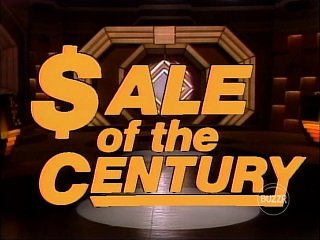
Sale of the Century is an American television game show that originally debuted on September 29, 1969, on NBC daytime. It was one of three NBC game shows to premiere on that date, the other two being the short-lived game shows Letters to Laugh-In and Name Droppers. The series aired until July 13, 1973, and a weekly syndicated series began that fall and ran for one season.

Hot Potato is a television game show that was broadcast on NBC in the United States from January 23 to June 29, 1984. From April 23 until its conclusion, the show was known as Celebrity Hot Potato.

Bullseye is an American game show that aired in syndication from September 29, 1980 to May 1982, with reruns continuing until September 24, 1982. Jim Lange was the host, and the program was produced by Jack Barry and Dan Enright. Jay Stewart was the announcer for the first season, and Charlie O'Donnell announced for the second season. The series' executive producer was Ron Greenberg.
The Joker's Wild is an American television game show that aired at different times between 1972 and 2019. In the show, contestants answer questions based on categories determined randomly by a mechanism resembling a slot machine. The show's title refers to the game's slot-machine mechanism also having jokers.

Twenty-One was an American game show originally hosted by Jack Barry that aired on NBC from 1956 to 1958. Produced by Jack Barry-Dan Enright Productions, two contestants competed against each other in separate isolation booths, answering general-knowledge questions to earn 21 total points. The program became notorious when it was found to be rigged as part of the 1950s quiz show scandals, which nearly caused the demise of the entire genre in the wake of United States Senate investigations. The 1994 film Quiz Show is based on these events. A new version of the show aired on NBC in 2000 with Maury Povich as host.

Chain Reaction is an American television game show created by Bob Stewart, in which players compete to form chains composed of two-word phrases.

The Magnificent Marble Machine was an American television game show that featured a giant pinball machine as its centerpiece. The program premiered on NBC on July 7, 1975 at 12:00 pm ET, replacing the short-lived game show Blank Check.
Time Machine is an American game show where contestants compete to answer trivia questions about popular culture and recent history to win prizes. The show aired on NBC from January 7 through April 26, 1985, and was hosted by John Davidson. Charlie Tuna was the announcer, with Rich Jeffries as his substitute. Reg Grundy Productions produced the series, and upon its premiere Time Machine was one of three Grundy series airing on NBC.

Dream House is an American game show that saw contestants competing to win, as the title of the show indicates, a new house. The show originally premiered in primetime on ABC on March 27, 1968, with a daytime edition premiering on April 1, 1968. The primetime series aired weekly until September 19, 1968 and the daytime series aired daily until January 2, 1970, when it was replaced with All My Children. The daytime series was revived for NBC's daytime schedule and premiered on April 4, 1983, running until June 29, 1984.

The Match Game-Hollywood Squares Hour is an American television panel game show that combined two panel games of the 1960s and 1970s – Match Game and Hollywood Squares – into an hour-long format.

Tic-Tac-Dough is an American television game show based on the paper-and-pencil game of tic-tac-toe. Contestants answer questions in various categories to put up their respective symbol, X or O, on the board. Three versions were produced: the initial 1956–59 run on NBC, a 1978–86 run initially on CBS and then in syndication, and a syndicated run in 1990. The show was produced by Barry & Enright Productions.
Fandango is a country music-themed quiz show which aired on The Nashville Network from March 8, 1983 to August 26, 1988, with reruns airing through March 31, 1989, when it was replaced by Top Card. Fandango was the first TV game show to air on TNN and was one of the longest-running game shows on a cable network.
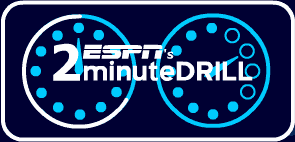
2 Minute Drill is an ESPN game show based on the general knowledge UK game show Mastermind. The program aired from September 11, 2000, to December 28, 2001. ESPN Classic aired reruns of the series daily at 11:30 am Eastern.
Balderdash is an American television panel game show that aired on PAX TV from August 2, 2004 to February 4, 2005, with repeats airing until April 22, 2005. It was hosted by Elayne Boosler and announced by John Moschitta. The game was based on the board game of the same name, which in turn is based on the parlour game Fictionary.
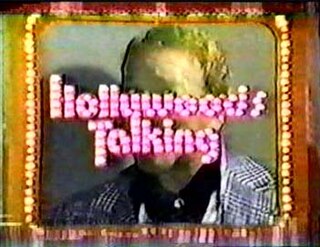
Hollywood's Talking is an American game show based on the 1960s quizzer, Everybody's Talking, and produced by Jack Barry. It ran on CBS for three months in 1973, debuting on March 26 and ending on June 22 to make room for a new version of Match Game.

Break the Bank is an American game show created by Jack Barry and Dan Enright and produced by their production company, Barry & Enright Productions. It was the first game show packaged by Barry and Enright as a tandem since their fall from grace following the 1950s quiz show scandals.
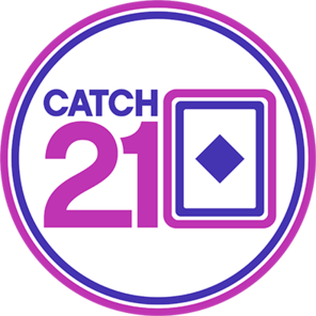
Catch 21 is an American game show broadcast by Game Show Network (GSN). Created by Merrill Heatter, the series follows three contestants as they play a card game centered on blackjack and trivia. The show is based on a popular online game from GSN's website and aired for four seasons from 2008 to 2011. It was hosted by Alfonso Ribeiro, with actress Mikki Padilla serving as the card dealer.
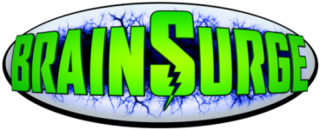
BrainSurge is an American children's game show that aired on Nickelodeon and was hosted by Jeff Sutphen. The show taped its first season in February 2009, and debuted on September 28, 2009. The show's format was adapted from the Japanese game show Brain Survivor. The U.S. version was created by Scott A. Stone, co-creator of Legends of the Hidden Temple, and Clay Newbill, executive producer of The Mole.















